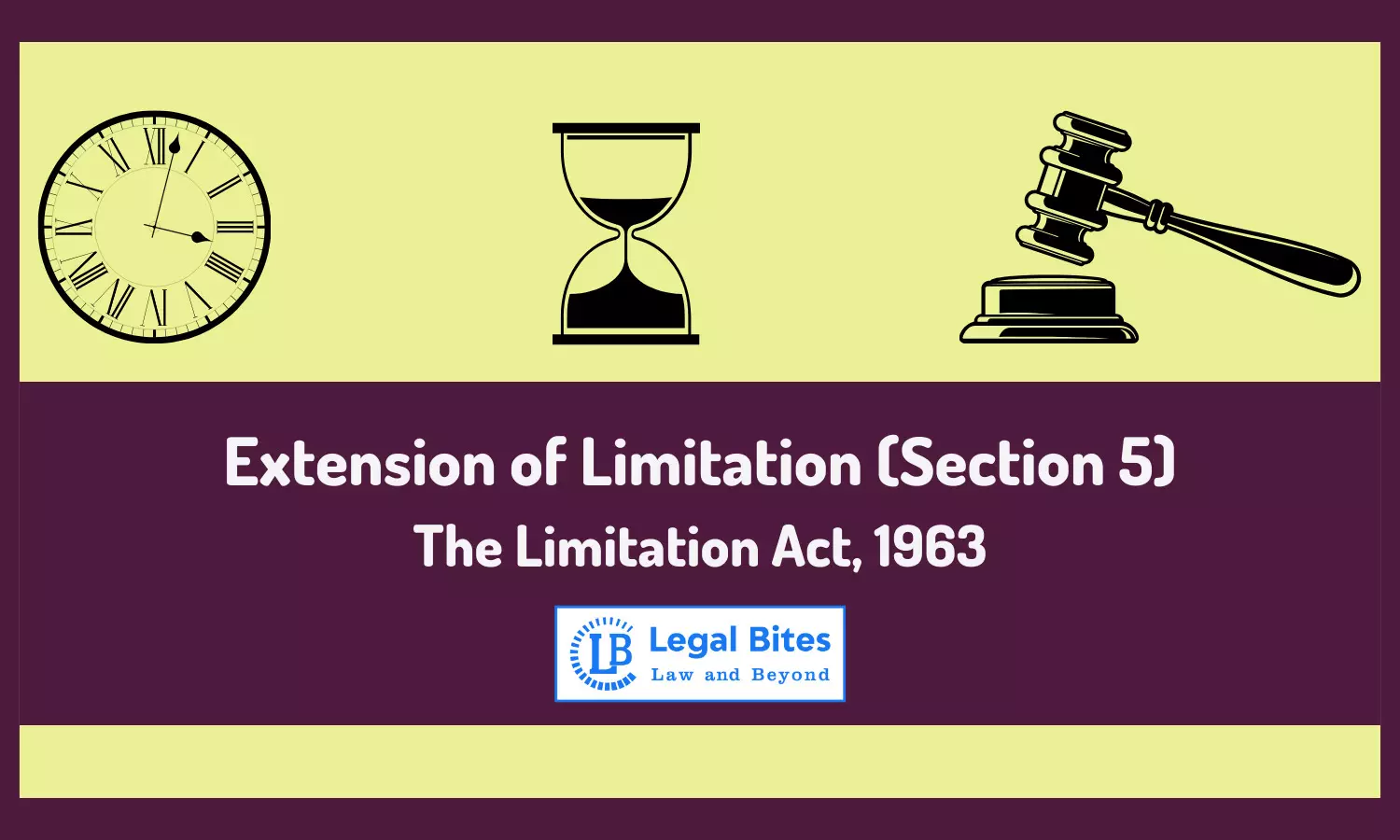Extension of Limitation (Section 5) | The Limitation Act, 1963
The article 'Extension of Limitation' delves into Section 5 of the Limitation Act, 1963, highlighting its provision granting courts discretionary powers to extend limitation periods.

The article 'Extension of Limitation' delves into Section 5 of the Limitation Act, 1963, highlighting its provision granting courts discretionary powers to extend limitation periods. This discretion enables courts to pardon delays if the party seeking an extension demonstrates reasonable cause. Furthermore, the article analyzes pertinent case precedents showcasing instances where courts have applied this provision to review and authorize legal proceedings even after the prescribed limitation period has lapsed.
Introduction
When it comes to legal proceedings, time becomes quite a critical factor which plays a vital role in the administration of justice. Therefore, the Limitation Act of 1963 (hereinafter “The Act”) serves as some sort of a timer which guides legal actions by setting a predetermined period within which the parties are needed to initiate legal proceedings or take any relevant legal action. There is already criticism regarding delays in reaching the doors of justice, so this Act becomes a saviour. Though this has not eliminated delay in justice, the Act has surely reduced the uncertainty involving a legal proceeding.
However, this rigidity regarding time limits at times may pose certain problems by becoming an obstacle for genuine cases to reach justice. To address this concern, Section 5 of the Act has been formulated which emerges as a nuanced provision that allows for “extension of prescribed period in certain cases”, as mentioned in the the provision itself, thereby allowing for the extension of the statutory time limitations under certain circumstances, given that the litigant had “sufficient cause”.
The explanation added to Section 5 says,
"The fact that the appellant or the applicant was misled by any order, practice or judgment of the High Court in ascertaining or computing the prescribed period may be sufficient cause within the meaning of this section."
In a nutshell, Section 5 of the Act provides for a dimension of flexibility by giving power to courts to condone the delays in the initiation of legal proceedings or filing of claims. This acts as a lifeline to the aggrieved persons who are struggling with the restrictions of time due to various reasons. This provision mitigates the outright dismissal of cases, which have actual merit, merely on the grounds of delay in filing.
In light of the importance of this provision, it becomes quite necessary to understand its intricacies, as it is a great example of the commitment of the legal system to be fair, and at the same time, it carries a thin balance between adherence to the rule of law and making sure that justice is done.
Therefore, this article tries to explore the extension of limitation under Section 5 of the Act and will also delve into the doctrine of sufficient cause, which forms the entire basis of such extension, if permitted by the court. The article tries to shed light on the significance of the provision in promoting justice, fairness, and equity within the legal system.
Doctrine of Sufficient Cause (With Examples)
The doctrine of sufficient cause is a major factor satisfying which the prescribed period of limitation can be extended by a court. This doctrine empowers the courts to condone the delays, if any, in the filing of suits or appeals, if the litigant can establish that there was a “sufficient cause” for the delay. As per the provision, any appeal or any application, besides application under Order XXI of the Civil Procedure Code, may be allowed after the expiry of the prescribed period if the court is satisfied that there was a reasonable or “sufficient” cause for such delay. In essence, it is the court that is given discretionary powers to extend the statutory limits based on the circumstances presented before them.
One important thing to note about the provision is that for the condonation of delay, examination of witnesses is not necessary, as the application is to be decided based on affidavits and such application for condonation of delay under Section 5 of the Act cannot be dismissed by a non-speaking order. Also, such condonation may apply to criminal appeals as well.
In Balwant Singh (Dead) v. Jagdish Singh & Ors., 1 (2010) 8 SCC 685, it was observed that even though sufficient cause is interpreted liberally, it could not be equated with doing injustice to the other party. So, for a sufficient cause to receive liberal treatment, the same must fall within a reasonable time and through proper conduct of the concerned party. This shows the importance of the provision, particularly this doctrine which is not used on anyone’s whims and fancies, but on the court’s satisfaction with the fulfilment of the sufficient cause factor. Also, in G. Ramegowda v. Spl. Land Acquisition Officer, (1988) 2 SCC 142¸ the liberal interpretation of the provision was also observed but it is to be done to advance “substantial justice” and in general cases, delays in case of filing appeals are needed to be condoned in the interest of justice where there is no gross negligence or purposeful inaction or lack of bona fide intention in part of the party who is seeking the condonation of delay.
This provision is applied only keeping fairness, justice and good conscience in mind where courts exercise this discretion only when they are satisfied that there is a good cause for making such delay in the filing of any application or appeal for the condonation of delay. After analyzing this doctrine, the key points of this doctrine come out to be:
- Discretion of the Court – Condonation of delay can only be allowed by the court after the fulfilment of its satisfaction.
- Subjective Issue – This is about the court’s discretion as what is considered to be sufficient cause is to be decided by the court.
- Negligence – The two aforementioned cases made it clear that in case of negligence in filing an appeal or any application, there can be no condonation of delay.
- Balance – This doctrine reflects the balance that is maintained between adherence to the rule of law and the administration of justice.
Some examples of sufficient cause include illness, bona fide belief in the validity of the claim, death of a family member causing grave mental and emotional distress, natural disasters, mistakes, etc. In these cases, condonation of delay may be allowed by the court after looking at the surrounding facts of each case.
Therefore, the doctrine of sufficient cause provides a safety net which allows the courts to exercise discretion and extend limitation periods when compelling reasons exist. It reinforces the principle that the rigid application of time limits should not lead to the denial of justice in meritorious cases.
Important Cases
(i) Collector, Land Acquisition, Anantnag v. Katiji, (1987) 2 SCC 107
This is a matter where the court dealt with one major question which was noted by Justice Thakkar as “whether or not to apply the same standard in applying the sufficient cause test to all the litigants regardless of their personality in the said context.” Regarding the doctrine of sufficient cause, the court observed that this expression used in the said provision is “adequately elastic” which enables courts to apply the law in a meaningful manner, where liberal interpretation is done, which allows them to meet the ends of justice.
In the instant matter, it was observed that by taking a justice-oriented approach, there was sufficient cause and it did not matter that a State was seeking a condonation for delay and not a private party. A State represents the collective cause of the community and it must not be treated like an unwelcome person. Therefore, it does not matter who files for condonation unless and until there is a sufficient cause, the application may be allowed by the court.
(ii) State of Nagaland v. Lipok AO, (2005) 3 SCC 752
In this case, it was noted that courts have to consider the “sufficiency of the cause and the shortness of the delay” and not the length of the delay while exercising the discretion given to them under Section 5 of the Act. The court observed that if appeals filed by a State are lost due to such delay, then it may not affect any person individually, but it will end up affecting the interest of the public. This is because decisions taken by the officers or agencies in the government are generally at a slow pace and considerable delays are bound to happen in filing any kind of application for condonation. Therefore, “sufficient cause” must be looked at from a justice-oriented approach instead of a technical analysis of the said doctrine.
It was also held that courts are required to decide such cases solely on merit.
Conclusion
In a nutshell, Section 5 of the Act allows for condonation of delay in filing of an application or appeal if sufficient cause is fulfilled. This Act tries to maintain a judicious balance between the necessity of adhering to the time limitations, i.e., the rule of law and the administration of justice. Through the discretionary powers provided to the courts, they can condone any delay made in initiating a legal proceeding or any other legal action if they are satisfied that there is a “sufficient cause” for such delay which may include illness, natural calamity, death, mistakes, etc. The court has the responsibility to distinguish between legitimate causes and lack of diligence. This provision strengthens the promise of the legal system to ensure fairness, good conscience and justice.
References
[1] Limitation of Suits, Appeals and Applications, Available Here
[2] The Limitation Act, 1963, Available Here
[3] Condonation of Delay Under Limitation Act, 1963, Available Here

